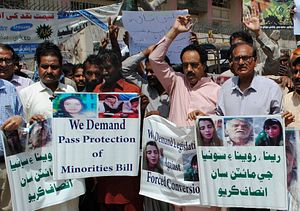A Pakistani court placed two teenage sisters from the minority Hindu community in a government shelter on Tuesday as authorities launched an investigation into whether the girls were abducted and forced to convert and marry two Muslim men.
The case of the sisters from the southern Sindh province has seen much traction in local media over the past days, going to the heart of two controversial issues in this predominantly Muslim nation: marriage of underage girls and forced conversions to Islam.
While marriage under the age of 18 is illegal in Pakistan, the law is often ignored. There is no legislation banning forced conversions.
The Islamabad High Court issued the protection order for the girls on Tuesday, saying it acted on a petition from the two. It also placed their husbands under protection but in a separate shelter, as they purportedly fear they could be attacked by the girls’ parents.
Pakistani media have cited the girls as claiming they were married of their own free will. Their lawyer, Mohammad Umari Baloch, claims they are not minors, contradicting the family’s statements.
The girls’ family, from the Sindh town of Ghotki, says the sisters are 13 and 15 years old and were abducted and forced to convert and marry the men. The sisters’ elder brother, Shaman Daas, said they were taken as the family was celebrating the Hindu annual festival of Holi last Friday.
“Their marriages should not have been performed and not by a Muslim cleric,” Daas told reporters.
Earlier, police in Sindh arrested several suspects in the case, including the cleric who performed the weddings on Friday. The arrests were made after Prime Minister Imran Khan ordered an investigation into the incident.
The Islamabad court said it would take up the case next Tuesday, after the probe is completed. The sisters’ parents are expected to attend the hearing.
A leading rights group, the Human Rights Commission of Pakistan, has urged the Sindh parliament to “take swift, serious measures to resurrect and pass the bill criminalizing forced conversions.”
The province’s parliament, the only one in Pakistan that has taken any action on forced conversions, failed to pass the bill banning it in 2016.
“At present, forced conversions are too easily — and too often — disguised as voluntary conversions, leaving minor girls especially vulnerable,” the commission said.
Dozens of human rights activists rallied Tuesday in the southern city of Hyderabad, denouncing the abduction of the girls and demanding the Sindh assembly adopt the bill against forced conversions.
Also Tuesday, lawmakers Jamshed Thomas and Shunila Ruth from the ruling Pakistan Tehreek-e-Insaf party submitted a bill to the National Assembly, seeking legislation against forced conversions.
“The abduction of the two girls from the Hindu community motivated us to submit this,” Thomas said. “Anyone who wants to change religion or marry a person of his or her choice should have this right, but not before the age of 18.”
By Munir Ahmed for The Associated Press.

































